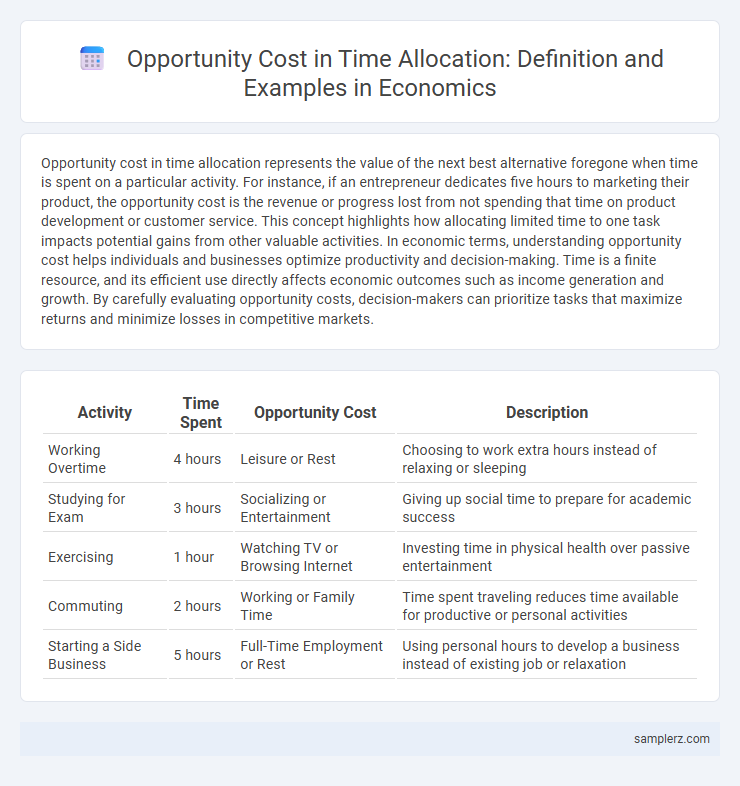Opportunity cost in time allocation represents the value of the next best alternative foregone when time is spent on a particular activity. For instance, if an entrepreneur dedicates five hours to marketing their product, the opportunity cost is the revenue or progress lost from not spending that time on product development or customer service. This concept highlights how allocating limited time to one task impacts potential gains from other valuable activities. In economic terms, understanding opportunity cost helps individuals and businesses optimize productivity and decision-making. Time is a finite resource, and its efficient use directly affects economic outcomes such as income generation and growth. By carefully evaluating opportunity costs, decision-makers can prioritize tasks that maximize returns and minimize losses in competitive markets.
Table of Comparison
| Activity | Time Spent | Opportunity Cost | Description |
|---|---|---|---|
| Working Overtime | 4 hours | Leisure or Rest | Choosing to work extra hours instead of relaxing or sleeping |
| Studying for Exam | 3 hours | Socializing or Entertainment | Giving up social time to prepare for academic success |
| Exercising | 1 hour | Watching TV or Browsing Internet | Investing time in physical health over passive entertainment |
| Commuting | 2 hours | Working or Family Time | Time spent traveling reduces time available for productive or personal activities |
| Starting a Side Business | 5 hours | Full-Time Employment or Rest | Using personal hours to develop a business instead of existing job or relaxation |
Balancing Work and Leisure: Opportunity Cost in Daily Schedules
Balancing work and leisure illustrates opportunity cost as time spent working reduces hours available for rest or personal activities, impacting overall well-being. For instance, choosing to work an extra two hours could increase income but means sacrificing relaxation or family time, which also holds significant value. Evaluating these trade-offs helps individuals allocate time efficiently to optimize productivity and life satisfaction.
Study vs. Socializing: Time Allocation Decisions for Students
Students face opportunity costs when allocating time between studying and socializing, as hours spent socializing reduce potential study time that could improve grades. For example, dedicating two extra hours to studying might increase exam scores by 10%, while using that time for social activities might enhance social skills but risk lower academic performance. Efficient time management requires evaluating the trade-off between immediate social benefits and long-term educational outcomes.
Commuting Choices: Weighing Time Against Productivity
Choosing between driving a longer route with less traffic and taking a direct but congested road exemplifies opportunity cost in commuting time allocation. The extra time spent driving could be used for productive work or leisure, highlighting the trade-off between time and output. Efficient commuting decisions directly impact overall economic productivity by optimizing time management.
Overtime Work: The True Cost of Extra Hours
Working overtime exemplifies opportunity cost in time allocation, as each extra hour spent earning additional income comes at the expense of leisure, rest, or personal development. Employees may increase short-term earnings, but the long-term cost includes potential burnout and reduced productivity. Businesses must balance overtime benefits against employee well-being and diminishing returns on extended hours.
Parenting and Career: Opportunity Cost in Family Time
Allocating extra hours to career advancement often reduces the time available for parenting, illustrating the opportunity cost in time allocation. Parents who choose to work late or take on additional projects may miss out on important family moments, affecting child development and family dynamics. Balancing career growth with quality family time is a critical economic decision that impacts long-term personal and professional outcomes.
Exercise or Entertainment: Allocating Free Time Wisely
Choosing to spend an hour exercising instead of watching a movie illustrates opportunity cost in time allocation; the benefit gained from physical health must be weighed against the immediate entertainment and relaxation from the movie. Prioritizing exercise enhances long-term well-being and productivity, while opting for entertainment provides short-term enjoyment and stress relief. Understanding this trade-off helps optimize free time for better personal and economic outcomes.
Investing in Skills: Education vs. Immediate Earnings
Choosing to invest time in education instead of immediate earnings exemplifies opportunity cost by forgoing short-term income for long-term skill acquisition and higher future wages. Allocating hours to skill development enhances human capital, potentially increasing lifetime earnings and employment opportunities. This trade-off highlights the economic principle that time dedicated to learning has a measurable cost in lost immediate wages but yields greater financial returns over time.
Volunteering: Sacrificing Income for Social Value
Volunteering often involves sacrificing potential income, illustrating the opportunity cost in time allocation. By dedicating hours to unpaid work, individuals forgo wages they could earn in paid employment. This trade-off highlights the economic principle where the value of lost earnings is weighed against the social benefits generated through volunteer activities.
Entrepreneurship: Startup Time vs. Stable Employment
Choosing to invest time in launching a startup involves the opportunity cost of foregone stable employment income and job security. Entrepreneurs allocate hours to business development, marketing, and product creation instead of steady wages and employee benefits. This trade-off highlights the economic principle of opportunity cost in personal time management within entrepreneurship.
Time Spent Shopping: Convenience vs. Money Saved
Choosing to spend several hours shopping at discount stores offers financial savings but incurs a significant opportunity cost in lost leisure or work time. Allocating time to convenient local stores reduces commute and browsing duration, increasing time available for productivity or relaxation yet potentially leading to higher expenses. Evaluating the trade-off between time spent and money saved is crucial for optimizing personal economic decisions and maximizing overall utility.

example of opportunity cost in time allocation Infographic
 samplerz.com
samplerz.com